John Janaro's Blog, page 251
July 30, 2015
The Golden Words of Peter of Ravenna

"As resplendent as the excellence,
power, and magnificence of the Creator were
when one contemplated His works,
all the same the love of God was concealed,
and the charity of God kept hidden.
To give to his subjects,
to bestow things on servants
is what usually characterizes a donor;
to suffer for one's subjects, to die for one's servants,
this is a sign of immense charity
and evidence of a love that is unique....
Anyone can grant favors, anyone can bestow gifts,
any prosperous benefactor can love
those who are deferential to him;
but will he be comparable to Him
who took the adversities of His own people onto Himself;
who puts Himself forward
to block dangers threatening His own;
who hands Himself over to punishments for His own,
who confronts death face-to-face
in order to remove them from destruction
and preserve them for life?
Love is proved by adversities,
the weight of affection is determined
by the dangers endured,
perfect charity is confirmed by death....
That dominion is true
which commands by love, not by fear;
which subjects both bodies and hearts to itself
by means of affection;
which by loving furnishes servants for itself
who are not unwilling, but willing.
[Jesus died because] He wanted it to be known
how much God loved humanity,
since He wanted to be loved rather than feared."
~Saint Peter Chrysologus (fifth century)
Published on July 30, 2015 20:51
July 29, 2015
Broken Openness
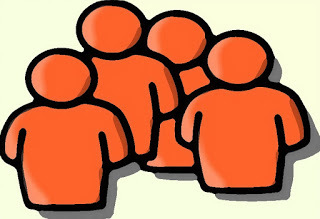 Relationships and community are so fundamental to being human -- to living fully as a person. Indeed, community and its organic expressions are fundamental to society.
Relationships and community are so fundamental to being human -- to living fully as a person. Indeed, community and its organic expressions are fundamental to society.We need community. We need persons and families connected to one another by the common experience of life, the common struggle for life's needs and celebration of its joys. In community, human persons journey together toward their destiny, helping one another. Without community, we cannot hope to find adequate solutions to any of the practical social troubles we face.
But how do we even begin to "build up" networks of trustworthy interpersonal relationships? Community, by its very nature, cannot be imposed by an ideological scheme. Rather, we build community from the ground up, person-to-person, and we can begin now concretely by living in solidarity with those who have been entrusted to us.
Perhaps some of us have been blessed with the very real "riches" of understanding, and we find that amidst much confusion we are among the few who are able to see the truth about certain significant problems. This gives us no grounds for pride, but only for gratitude to God for this gift, and for whatever goodness we find in ourselves.
Let us be determined to share God's gifts, and to receive the gifts of others in turn. We must never forget that the person we meet, in whatever circumstances, is a unique someone, called and blessed and loved by God with an awesome and mysterious love.
Therefore, we must try to help one another as best we can and with the resources we have. We must love one another in the recognition that we are all sinners, we are all broken, and then listen to one another, help one another to recognize reality, and especially be ready to "suffer-with" one another. Since we are all selfish and make mistakes, we must above all forgive one another and bear with one another just as God forgives us and approaches us with such tenderness and patience.
Relying on His mercy, we must take up each day with our "broken openness," our poor expression of friendship and our desire to understand with compassion the persons He has given to us.
Published on July 29, 2015 11:30
July 28, 2015
Teresa Gives Me a Haircut
Teresa was messing with my hair and got it all sticking up in the back (see The Haircut, top left). I was grumbling about how I really needed a haircut.
But the girls thought it looked funny so I let them take a picture of me as the bald-topped, hairy-headed wild man. Then Teresa offered to cut it, and I couldn't refuse. After all, if she can groom horses she can buzz off a clump of old and tired gray strands from my head.
And so she did. I played shocked, but actually I was glad to have it all off.

Thank you, Teresa. You're such an awesome kid!
She doesn't like to be told this, but as you can see she's very pretty.

But the girls thought it looked funny so I let them take a picture of me as the bald-topped, hairy-headed wild man. Then Teresa offered to cut it, and I couldn't refuse. After all, if she can groom horses she can buzz off a clump of old and tired gray strands from my head.
And so she did. I played shocked, but actually I was glad to have it all off.

Thank you, Teresa. You're such an awesome kid!
She doesn't like to be told this, but as you can see she's very pretty.

Published on July 28, 2015 20:00
July 27, 2015
The Value and the Abuse of Human Trust
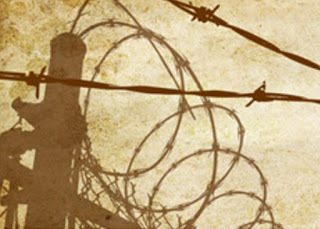 We cannot live as human persons or build human community together if we cannot trust one another. Trust is a normal component of human communication, and it is founded on the basic expectation we have that others are telling the truth. The expectation of truth and the human orientation to trusting place great responsibility on anyone who takes up a position of authority in a community.
We cannot live as human persons or build human community together if we cannot trust one another. Trust is a normal component of human communication, and it is founded on the basic expectation we have that others are telling the truth. The expectation of truth and the human orientation to trusting place great responsibility on anyone who takes up a position of authority in a community.One way or another, we must keep the trust that is given to us (especially if we are in a position of authority). When this trust breaks down, we are forced to live in suspicion of one another and we become increasingly isolated. This is why deception is destructive in human relationships: when it is exposed, trust is compromised, but when it succeeds, trust is abused and becomes the inroad to manipulation of others. When authorities abuse trust, they can cause great damage to persons and communities.
Human beings make daily decisions in many things through a complex and informal reasoning process. And yet we do this spontaneously and with a measure of confidence in our understanding. This is founded not only on common sense realism, but also on the interpersonal context within which we perceive and judge things.
We approach reality as persons-in-relationship with others, and among the crucial relationships in life are the connections we have with authorities. Our method of understanding will not be solid, however, if it merely conforms to an external source through coercion. Rather, the reasonable and personal response to a genuine authority is trust.
Thus we can see that trust is essential to everyday life.
We live by trust all the time, in the most mundane circumstances. For example, I would not embark on a unknown difficult hike (back in the days when I was able to hike) without someone who knew the path. Or at least I would take a map (made by someone else).
Am I being unreasonable in so doing? Certainly not, because often the reasonable thing to do is to trust someone else's authority. People tend to rely on what they perceive to be authority much more than they realize. It's natural to trust, and we do a lot of it every day. This can be simply recognizing that someone has the knowledge we need in a particular circumstance and is willing to convey it (a very basic kind of "authority"). But it also spans over a whole range of relationships and activities right up to the cohesiveness of a political and social community.
It is reasonable to trust others whose authority is a service to us. But it is also reasonable (indeed essential) that we have at least a common sense judgment that an authority is trust-worthy (or if we can't have that judgment, we have a right to know what level of risk we're taking in "lending" credibility to an unverifiable source).
Here is where human pride and ambition can play clever games and use tricks to buy our trust through fixating our fascination, making false promises, and using psychological or emotional manipulation. The result is a pathological, dehumanizing false trust that takes advantage of and distorts this essential feature of human living.
Sometimes the abusers of trust simply want to cheat us. People are thus misled, innocently, to a shakedown. We trust the wrong people, and then we discover that the investment was a fake and our money is all gone. In such cases we experience how deception is a form of violence: it makes a bald, frontal attack on our trust, in order to profit from it.
But the more psychologically complex abuse of trust holds out promises, draws us along, and tangles our own hopes within its web of lies. Soon we begin ourselves to connive in the deception, as we dismiss "warning signs" -- issues that require examination and verification -- because we have become attached to false hopes. When this happens, we are in danger of losing much more than our money.
Trust is a powerful energy within the person, which is why the systematic manipulation and abuse of trust can cause a counterfeit of community. It can lead to an efficient conformity between oppressors and the oppressed based on external fear, or (something worse) the internal subversion of the expectations and desires of people.
Thus it is that the abuse of trust leads to the cult, the fanatical revolutionary or reactionary party, the dictatorship, the all-encompassing conformity, the blind devotion to false duty, the persecution of non-conformists (whether they willfully resist or simply belong to the wrong ideological category), the concentration camps, the gas chambers, the gulag, the "re-education" program.
We saw this kind of abuse of trust on a vast scale in the past century and we continue to see it today, in new and diverse ways. We must especially pay attention to the "softer" forms of the abuse of trust, in which social forces connive to bring about the manipulation and standardization of opinion. Anyone who tries to expose "soft" conformity is threatened not with the death camp, but with social marginalization.
Such soft conformity, however, is not and cannot bring forth a genuine human community. It delivers only superficial sentiments of common affirmation, beneath which yawn great chasms of mistrust, suspicion, isolation, and loneliness.
Without real trust between people there can be no community. And there can be no constructive human society without institutions and authorities that are worthy of people's trust.
Published on July 27, 2015 20:41
July 25, 2015
Saint James the Apostle: A Model For Today?
"King Herod laid hands upon some members of the church to harm them. He had James, the brother of John, killed by the sword" (Acts 12:2).

Today is the Feast of Saint James the Apostle, the first of the Twelve to be martyred. The iconic imagery of the martyrdom of Saint James (who was beheaded around 44 a.d.) is from a window in Lancaster (Catholic) Cathedral in England.
As I pondered this image, I thought, "Hey... this looks familiar. Haven't I seen images like this recently in the news? " Indeed, I have.
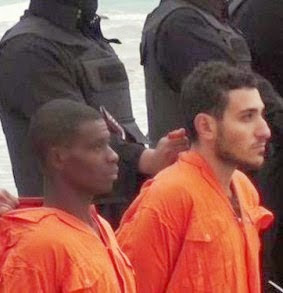
Two thousand years later, Christians are still getting their heads cut off for adhering to Jesus Christ. Look, Saint James even happens to have an orange robe in the stained glass window above, not unlike the orange jump suits of these Eygptian Christians from a few months ago. All James's killer needs is a mask, and he could pass for an ISIS executioner.
The blood of Saint James was the seed of the Church, and so too will be the blood of the martyrs of the 21st century.

Today is the Feast of Saint James the Apostle, the first of the Twelve to be martyred. The iconic imagery of the martyrdom of Saint James (who was beheaded around 44 a.d.) is from a window in Lancaster (Catholic) Cathedral in England.
As I pondered this image, I thought, "Hey... this looks familiar. Haven't I seen images like this recently in the news? " Indeed, I have.

Two thousand years later, Christians are still getting their heads cut off for adhering to Jesus Christ. Look, Saint James even happens to have an orange robe in the stained glass window above, not unlike the orange jump suits of these Eygptian Christians from a few months ago. All James's killer needs is a mask, and he could pass for an ISIS executioner.
The blood of Saint James was the seed of the Church, and so too will be the blood of the martyrs of the 21st century.
Published on July 25, 2015 20:13
July 24, 2015
The Narrow Road of Growing in Love
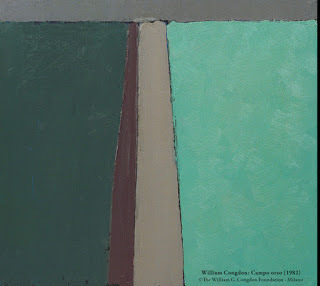 I'll be the first to admit that I'm lazy. We're all lazy. Let's face it.
I'll be the first to admit that I'm lazy. We're all lazy. Let's face it.But let's also dwell on this fact: if we remain lazy, we will never grow in love.
When we see the smallness of our love, the way that our lives are dominated by mediocrity, we are tempted to just reduce our expectations, or to put off the business of growing in love.
We pretend that we're "okay," that our lazy, mediocre lives are "good enough." But they're not.
We don't want to admit to ourselves that we are made for love, that all the turmoil inside of us is the anguished cry of our being, the cry for love. Even underneath our laziness is a kind of desperation to hold onto what we have, because we don't know if there is anything out there "beyond ourselves" and we don't want to take the risk.
But really, are you satisfied with what you have now. Really?
Still, we don't even know how to begin living the depth of love that stirs within us. We are afraid. How awful it is to face our fragility, our vulnerability, our weakness, our failures, and the deep wounds of our own selves.
And we can become frozen in our shriveled hearts if we give in to discouragement. "I have tried to love before, but all I've done is screw things up. I don't know how to love and I don't want to try. It's too dangerous!"
This is a moment where my freedom is challenged in a critical way. I have a choice. I can give in to discouragement. Or I can begin from my poverty, and beg for help.
When we do cry out for help, it may feel like a waste of time, because help doesn't seem to be coming. There are no signs and wonders, no great miracles. We are still broken and confused. We are begging for help, but it seems that nothing happens, nothing changes.
That is not true.
Look! We are already doing something.
In that begging is already the recognition that we need to love and to be loved. In that begging is already the recognition that there is someone worth loving. If I were really alone, it would never even occur to me to ask. Someone is already here, helping me now.
So I beg for help, I beg for the One who is already helping me, loving me: the One who is with me. And I begin to love. Of course, I'm still confused. I forget. But there are moments when I remember, and I know when this happens that I am not the source of that memory. The One who loves me touches my life. I give Him thanks, and I beg for these moments to increase.
This asking, this prayer, allows Him to open our hearts and draw us, more and more. It allows Him to shine light on our lives so that we might see their meaning, more and more, in relation to Him.
This is the narrow road of growing in love.
Published on July 24, 2015 20:27
July 22, 2015
The Woman Who Saw Jesus: Mary Magdalene
 Saint Mary Magdalene, with flask of myrrh and egg
Saint Mary Magdalene, with flask of myrrh and eggsymbolizing the resurrection.
 Antiphon
Antiphon Resurrection
Resurrection
Published on July 22, 2015 19:48
July 20, 2015
This Great and Deep Longing
 Longing, yearning, aching for that ultimate "something"--this is the root of my identity and my actions. It is the way my heart is made.
Longing, yearning, aching for that ultimate "something"--this is the root of my identity and my actions. It is the way my heart is made.Most of the day I smother this great and deep longing of the heart, or at least I try. It is so vast, so much beyond my control, so provocative to the dreams of comfort that I fool myself with. But it is what makes for every authentic engagement of life that I manage in a day.
It makes it possible to perceive things as they really are and to recognize that my relationship with reality consists in a recognition of its beauty and a joy tinged with sadness--things are and yet they are not enough.
Being Christian does not take away this yearning. Rather, it intensifies it. It does not remove the sweet pain of my need for the Infinite. On the contrary, Christianity is the revelation that the Infinite One has embraced my life.
Being Christian makes it possible to live life according to its true meaning, without escape or desperation.
Usually I don't live this possibility. I flee every day, into my own schemes and vain imaginings and grasping and blindness. But I have moments when I remember that this is what life is really all about.
They are moments of prayer. They generate hope.
In hope, I truly begin to live.
Published on July 20, 2015 10:00
July 17, 2015
War of Words
 Words are whirling like a storm, like bullets flying, like glass shattered in the wind.
Words are whirling like a storm, like bullets flying, like glass shattered in the wind.We use more words today than ever before in history, and we have more media platforms to say them, text them, post them.
For all that, so many of our words boil down to people saying things to people about other people.
We classify our discourse as expressing opinion, conveying information, or engaging in journalism, scholarship, analysis, etc., etc., etc. Yet what so much of it really is, in the end, is one form or another of self-affirmation, gossip, unnecessary curiosity, detraction, calumny, or cynicism.
We use words to assert ourselves, or to make war on one another. And our words express what is inside our hearts. We have hearts full of violence.
This has much to do with lack of real communication that displays itself so fiercely in Internet comboxes and social media networks, as well as in human interactions in so many other areas. Here online, it can become a concentrated barrage. Multimedia words and images, comments sharp as daggers, unfounded accusations and personal attacks.
It becomes difficult to remember the topic or controversy, to keep it focused and grounded, much less to embark with others on a journey to find the truth or deepen our understanding of it. I know very well that some of these matters are urgent and that it is necessary to fight for the good. Too often, however, a perceived "expedience" trumps respect for human persons.
We have let the sun go down on our anger. When anger takes over, the first casualty is beauty. If we speak the truth without its splendor (which has nothing to do with fancy words), we fail to communicate, we fail to help others to see reality. We can put the shape of our own desperate anger even on the truth. It's not surprising that others don't listen, or that they strike back. Our words attack them like a knife in the stomach.
The word "hate" is tossed about. All kinds of accusations abound from all sides. Are we really fighting for the good. Are we fighting for love?
Or are we trying to "win" our own victory? Are we lashing out in perceived self-defense, frustration, or to cover up our own problems?
Often it's a tangled combination of all these motives all mixed up together.
I have asked myself, "How often, when I speak or write, are my words aimed at distraction, or at defensiveness, or at drawing attention to myself? And what am I looking for when I listen to or read the words of others?" How many wasted words! Foolish words. It becomes draining and discouraging, this war of words.
I think perhaps we use words foolishly because we are insecure. We are insecure.
Why?
Because we are afraid that we are not loved. Or, rather, we have forgotten that we are loved. We are not nourished by a vital connection with the One who loves us. We need prayer.
And not just more words of prayer. We need silence.
We need to let Him love us.
Published on July 17, 2015 10:00
July 16, 2015
Our Lady of Mount Carmel
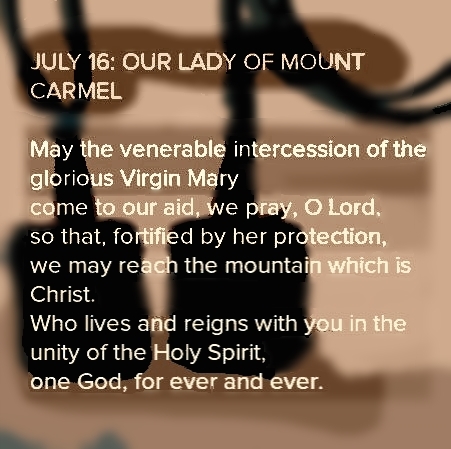
"Mother of Christ, let there be revealed, once more, in the history of the world the infinite saving power of the Redemption: the power of merciful Love! May it put a stop to evil! May it transform consciences! May your Immaculate Heart reveal for all the light of hope!" (Saint John Paul II).
Published on July 16, 2015 14:00



